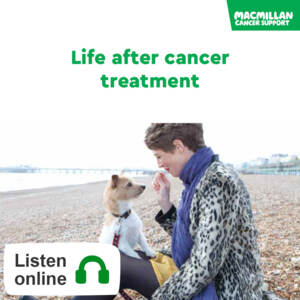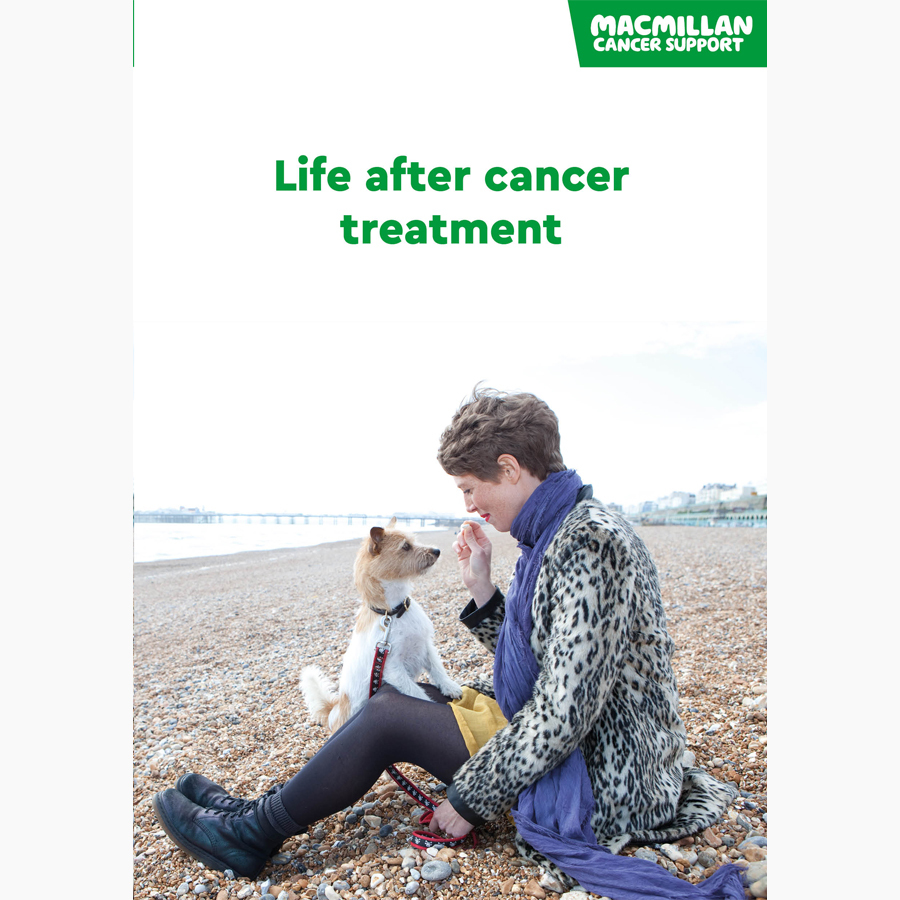Follow-up care after cancer treatment
What is follow-up care after treatment?
After your main treatment ends, your cancer team will usually arrange for you to have check-ups or any scans you may need. This is called follow-up care. How often you have these appointments depends on different things, including:
Related pages
Booklets and resources
Your follow-up appointment
The aim of this appointment is to make sure everything is going well for you. It is a chance for you to talk about any concerns you have. The appointment helps your cancer team notice any possible problems early.
They may examine you and do some simple tests, such as taking a blood sample. They will usually ask questions about your recovery and any side effects or symptoms you have. They can give you advice and support on how to manage these.
It is important to attend your appointments. These may be in-person, phone or video appointments. If you cannot attend because you are not feeling well, tell the clinic. They can arrange another appointment for you.
You may feel worried before an appointment. But your cancer team will support you. For some people, going back to hospital for face-to-face appointments can be difficult. But for others, it can be a positive reminder that they are returning to everyday life. You may feel reassured after your visit.
Your cancer team can refer you to other services if you need specialist help. For example, they may refer you to a psychologist or counsellor for emotional support, or a physiotherapist for advice about exercising.
Ways of having follow-up care
There are different ways of having your follow-up care.
Appointment with your cancer doctor or specialist nurse
You may have regular face-to-face appointments at the hospital. Or you may have virtual appointments over video call or phone call. The appointment will usually be with someone from your cancer team. Your cancer team will discuss your follow-up care with you. You can decide together what is best for you. Sometimes you may have some of your follow-up with your GP.
In the first year after your treatment, the appointments may happen every few months. As time goes on, the appointments will happen less often. You may be asked to have a blood test or scan before an appointment. This helps make sure your results are available for the appointment. If you are not sure whether this is needed, ask your cancer team.
Shared care
Shared care is when your follow-up care is shared between your cancer doctors or specialist nurses and your local hospital or GP. For example, you may have tests and scans at your local hospital. Some GPs have an agreement with the hospital to share your follow-up care.
Self-management
Some people have supported self-management follow-up instead. This is when you are supported by your nurse and cancer team to manage your health.
You may have regular phone appointments with your specialist nurse or someone else from the cancer team. Or you may be asked to contact the cancer team if you are worried about anything or if you need support.
If they think anything needs to be checked, they will arrange this. If you need regular tests and scans, they will be arranged for you. You will also have direct access to your cancer team if you need it. They will give you information on:
- side effects
- symptoms to look out for
- what you can do to keep healthy
- where to get support.
Self-management allows you to be more in control of your care. But you can always contact your cancer team, GP or other healthcare professionals for help if you need it.
We have more information about self-management.
Tips for getting the most from your follow-up appointment
- Write down any questions before your appointment. You can also write down the answers to help you remember them.
- Take someone with you. They can support you and help you remember what was said.
- You can ask for copies of any letters so that you can keep track, or ask for a treatment summary.
- Always tell your cancer team about any ongoing or new symptoms, or other health worries.
- Tell them how you are coping with your feelings. They can give you advice or direct you to the right place for support.
- Tell them if you are taking any prescribed or non-prescribed medicines. This includes vitamins, minerals, or herbal or complementary medicines. These can affect other drugs, including some cancer treatments.
- Be honest with your cancer team. This helps them to give you the best support.
Related pages
Your GP and primary care team
Your GP and other members of the primary care team can support you during and after treatment. The primary care team may include your GP, practice nurse, and other health and social care professionals who work in the community.
If you have not met with them during treatment, it is a good idea to make an appointment when it finishes. Your cancer team will send them a report about your treatment – this is called a treatment summary. You should always tell your GP about any problems you need help with.
Some GPs have an agreement with the hospital to share your follow-up care. They may also prescribe some of the drugs you need. They may be part of your shared follow-up care.
Your GP is responsible for your general health. They can also give you emotional support and advice on:
Your GP practice may also be able to support people close to you.
It is important to care for your general health. Remember to keep going to any regular check-ups at your GP practice – for example, blood pressure checks or blood tests. It is also important to take part in NHS screening.
Booklets and resources
Your cancer care review
You may have an appointment with your GP or someone else from the primary care team after you have been diagnosed with cancer. This is sometimes called a cancer care review.
A cancer care review is usually done within 12 months of being diagnosed. The review may happen a few months after being diagnosed, or sometimes later after your treatment has finished. But you can ask for a cancer care review at any point.
Your primary care team may get in touch with you first, by phone or by sending you a letter. Or you can contact them. The cancer care review can be done face to face, over the phone or through a video call (virtually).
Your primary care team will check whether you have any concerns or need any more information or support. They will talk to you about the cancer and the treatment. You may have a Holistic Needs Assessment (HNA). This is a discussion and assessment with someone from your healthcare team. This helps to make sure you are getting the right support for the things that are most important to you.
Your cancer care review is a chance to talk about:
- how you are feeling
- any new worries or concerns that you have
- any changes in your concerns
- what can help you manage and cope with these concerns
- what support is available in your area.
If you have a personalised care plan or treatment summary, take it with you. If you have completed your treatment, your GP may already have a treatment summary from your cancer team.
Your primary care team can help you understand which symptoms to look out for. They can also advise when you might need to contact your cancer team.
Support from Macmillan
Macmillan is also here to support you. If you would like to talk, you can do the following:
- Call the Macmillan Support Line for free on 0808 808 00 00.
- Chat to our specialists online.
- Visit our life after cancer forum to connect with people who have been affected by cancer, share your experience, and ask an expert your questions.
Related pages
About our information
This information has been written, revised and edited by Macmillan Cancer Support’s Cancer Information Development team. It has been reviewed by expert medical and health professionals and people living with cancer.
-
References
Below is a sample of the sources used in our after treatment information. If you would like more information about the sources we use, please contact us at cancerinformationteam@macmillan.org.uk
ESMO Expert Consensus Statements on Cancer Survivorship: promoting high-quality survivorship care and research in Europe. Published: 10 August 2022. Annals of Oncology (accessed April 2023).
NHS Personalised Stratified Follow Up (PSFU) Pathway in Cancer Care. Published 2022.
Macmillan Cancer Support. Providing personalised care for people living with cancer: a guide for professionals providing holistic needs assessments, care and support planning. Published October 2019. Available from: www.macmillan.org.uk
Date reviewed

Our cancer information meets the PIF TICK quality mark.
This means it is easy to use, up-to-date and based on the latest evidence. Learn more about how we produce our information.
The language we use
We want everyone affected by cancer to feel our information is written for them.
We want our information to be as clear as possible. To do this, we try to:
- use plain English
- explain medical words
- use short sentences
- use illustrations to explain text
- structure the information clearly
- make sure important points are clear.
We use gender-inclusive language and talk to our readers as ‘you’ so that everyone feels included. Where clinically necessary we use the terms ‘men’ and ‘women’ or ‘male’ and ‘female’. For example, we do so when talking about parts of the body or mentioning statistics or research about who is affected.
You can read more about how we produce our information here.






